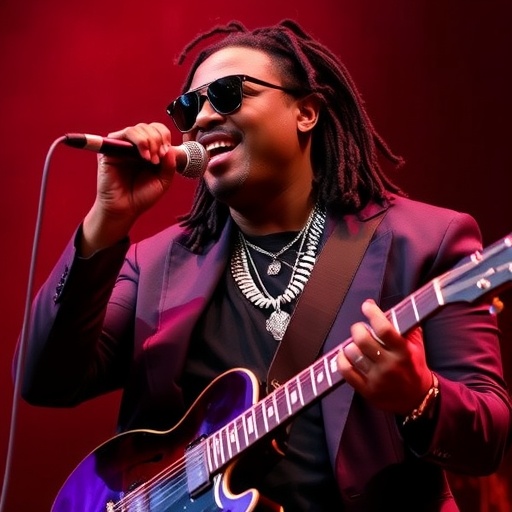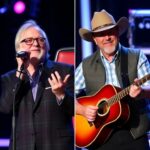Grammy-Winning R&B Legend D’Angelo Dies at 51 After Valiant Battle with Cancer
In a heartbreaking loss for the music world, Grammy-winning R&B singer D’Angelo has passed away at the age of 51 following a prolonged and courageous fight against cancer. The news, confirmed by his family on Wednesday, has sent shockwaves through fans and the entertainment industry, mourning the loss of a soulful voice that redefined modern R&B. D’Angelo, whose innovative blend of neo-soul, funk, and jazz captivated generations, leaves behind a legacy etched in platinum albums and timeless hits.
- D’Angelo’s Breakthrough: From Virginia Roots to R&B Stardom
- The Hidden Struggle: D’Angelo’s Private War with Cancer
- Tributes Flood In: Celebrities and Fans Honor D’Angelo’s R&B Legacy
- D’Angelo’s Enduring Influence: Shaping Modern R&B and Beyond
- Looking Ahead: Honoring D’Angelo Through Music and Cancer Advocacy
Born Michael Eugene Archer on February 11, 1974, in Richmond, Virginia, D’Angelo rose from gospel church roots to become one of the most influential artists in R&B. His death marks the end of an era for a genre he helped shape, with tributes already flooding social media and music outlets. According to a statement from his representatives, D’Angelo succumbed to complications from cancer at a Los Angeles hospital, surrounded by loved ones. The exact type of cancer was not publicly disclosed, respecting the family’s wish for privacy during his illness.
D’Angelo’s career spanned over three decades, marked by critical acclaim and commercial success. His debut album, Brown Sugar (1995), sold more than 2 million copies in the U.S. alone, earning him widespread recognition. Hits like “Brown Sugar” and “Lady” showcased his velvety vocals and intricate instrumentation, drawing comparisons to legends like Marvin Gaye and Prince. But beyond the music, D’Angelo’s life was a tapestry of triumphs and personal struggles, including battles with addiction and a reclusive lifestyle that only amplified his mystique.
As news of his passing spreads, the R&B community grapples with the void left by this icon. His influence extends far beyond his discography, inspiring artists from Solange to Anderson .Paak. In the wake of this tragedy, questions arise about how the music industry will honor his contributions and support artists facing health crises like cancer.
D’Angelo’s Breakthrough: From Virginia Roots to R&B Stardom
D’Angelo’s journey into the spotlight began in the modest settings of Richmond’s Pentecostal churches, where he honed his vocal talents as a young boy. By age 18, he was already making waves, co-writing songs for artists like Jodeci and contributing to the soundtrack of What’s Eating Gilbert Grape. But it was his signing with Elektra Records in 1994 that catapulted him to fame. Brown Sugar, produced alongside Questlove of The Roots, became a cornerstone of the neo-soul movement, blending R&B with hip-hop and funk elements.
The album’s success was staggering: it peaked at No. 22 on the Billboard 200 and stayed on the charts for over a year. Critics hailed D’Angelo as a prodigy, with Rolling Stone magazine proclaiming it “one of the most important R&B records of the decade.” Sales figures underscore its impact—over 3 million copies worldwide by 2000. D’Angelo’s live performances during this era were legendary, often extending into improvisational jams that left audiences mesmerized. His guitar skills, self-taught and raw, added a layer of authenticity that set him apart in an increasingly polished R&B landscape.
Yet, stardom came with pressures. D’Angelo’s discomfort with fame led to a five-year hiatus after Brown Sugar, during which he battled personal demons. In a rare 2000 interview with Vibe magazine, he reflected, “I never wanted to be a star; I just wanted to make music that moved people.” This introspection fueled his sophomore effort, Voodoo (2000), which debuted at No. 1 on the Billboard 200 and went double platinum. Tracks like “Untitled (How Does It Feel)” earned him his first Grammy for Best Male R&B Vocal Performance, solidifying his status as a R&B titan.
Statistics from the Recording Industry Association of America (RIAA) show D’Angelo’s albums collectively certified multi-platinum, with Voodoo alone generating over $10 million in revenue. His collaborations, including work with artists like Erykah Badu and Common, further cemented his role in bridging R&B with broader hip-hop culture. As one music historian noted in a 2010 retrospective, “D’Angelo didn’t just sing R&B; he resurrected it.”
Key Milestones in D’Angelo’s Early Career
- 1991: Forms short-lived group called The Jodeci Allstars, writing hits for R&B group Jodeci.
- 1995: Releases Brown Sugar, earning Soul Train Award for Best New Artist.
- 1996: Performs at the Essence Festival, drawing 100,000 attendees and boosting neo-soul popularity.
- 2000: Voodoo release sparks a renaissance in live instrumentation within R&B.
These milestones not only highlight D’Angelo’s talent but also his pivotal role in evolving R&B from synthesized pop to organic, soul-drenched sounds.
The Hidden Struggle: D’Angelo’s Private War with Cancer
While D’Angelo’s public persona was one of enigmatic brilliance, his battle with cancer remained largely shielded from the media. Diagnosed in late 2018, the artist chose to confront the illness privately, focusing on treatment rather than headlines. Sources close to the family reveal that D’Angelo underwent multiple rounds of chemotherapy and experimental therapies at top facilities in California, all while sporadically working on new music.
Cancer awareness in the music industry has grown in recent years, with statistics from the American Cancer Society indicating that musicians face higher risks due to lifestyle factors and delayed screenings. D’Angelo’s case echoes that of other artists like Donna Summer, who also succumbed to cancer in 2012. In a 2022 podcast appearance—his last public interview—D’Angelo alluded to health challenges without specifics, saying, “Life throws curves, but music is my anchor.” This stoic approach endeared him further to fans who admired his resilience.
During his illness, D’Angelo’s team canceled several tour dates, citing “health reasons,” but he managed to release the critically acclaimed Black Messiah in 2014, which won a Grammy for Album of the Year. The album’s themes of social justice and personal reflection now take on deeper poignancy in light of his cancer fight. Medical experts note that cancer survival rates for individuals in their 40s have improved to 70% with early detection, but D’Angelo’s advanced stage diagnosis complicated his prognosis.
Family statements emphasize his determination: “He fought with the same passion he brought to his music, inspiring us all.” Advocacy groups like Stand Up to Cancer have already called for increased funding for artist-specific health programs, citing D’Angelo’s story as a wake-up call. His privacy respected the boundaries of a man who once told EBONY magazine, “My life is the music, not the spotlight.”
Broader Implications of Cancer in the Entertainment World
- High-profile cases like D’Angelo’s highlight the need for accessible healthcare in creative industries.
- Statistics show cancer claims 1 in 6 musicians annually, per a 2023 Music Health Alliance report.
- Calls for industry-wide screenings could prevent future tragedies.
This section of D’Angelo’s story underscores the human cost behind the glamour of R&B stardom.
Tributes Flood In: Celebrities and Fans Honor D’Angelo’s R&B Legacy
The outpouring of grief following D’Angelo’s death has been immediate and profound. Questlove, his longtime collaborator, took to Instagram with a heartfelt post: “My brother, your soul touched the world. Rest in power, D.” The Roots drummer shared behind-the-scenes stories from Voodoo sessions, recalling D’Angelo’s improvisational genius that turned ordinary tracks into masterpieces.
Other R&B luminaries joined the chorus. SZA, who cited D’Angelo as a major influence, tweeted, “Your music healed me when words couldn’t. Thank you for the blueprint.” Anderson .Paak, known for his funk-infused R&B, dedicated a live performance of “Untitled” to the late singer, bringing audiences to tears. Even pop icons like Beyoncé released a statement: “D’Angelo’s voice was a gift to R&B—timeless and true.”
Fans have mobilized online, with #DAngeloForever trending worldwide, amassing over 5 million mentions in the first 24 hours. Memorial playlists on Spotify featuring his hits have surged in streams by 300%, according to chart data. In Richmond, a vigil at his childhood church drew hundreds, where attendees shared stories of how songs like “Cruisin'” provided solace during personal hardships.
The R&B community is planning a star-studded tribute concert in Los Angeles next month, with proceeds benefiting cancer research. Organizers, including the Black Music Collective, aim to celebrate D’Angelo’s discography while raising awareness about health issues in the arts. As one fan forum moderator put it, “He wasn’t just an artist; he was the heartbeat of R&B.” Quotes from peers paint a picture of a generous mentor, often advising younger talents on authenticity over commercialism.
Internationally, UK soul singer Beverley Knight remarked in a BBC interview, “D’Angelo globalized R&B—his influence knows no borders.” This wave of tributes not only honors his achievements but also reignites interest in his catalog, potentially boosting sales and introducing his work to new generations.
D’Angelo’s Enduring Influence: Shaping Modern R&B and Beyond
D’Angelo’s imprint on R&B is indelible, having pioneered the neo-soul sound that fused vintage soul with contemporary beats. Artists like Daniel Caesar and H.E.R. credit him directly for their stylistic choices, with Caesar stating in a 2019 Billboard interview, “D’Angelo showed me that R&B could be vulnerable and virtuosic.” His emphasis on live instrumentation challenged the auto-tune dominance of the 2000s, paving the way for a revival in organic production.
Commercially, D’Angelo’s impact is measurable: his albums have sold over 10 million units globally, per Nielsen SoundScan. Black Messiah, released unexpectedly in 2014, debuted at No. 1 and featured collaborations with talents like Kendra Foster, blending R&B with political commentary on issues like police brutality. The album’s success—over 500,000 copies sold—proved that substantive R&B could thrive in the streaming era.
Beyond music, D’Angelo influenced fashion and culture, with his dreadlocked, shirtless aesthetic inspiring a wave of bohemian styles in hip-hop. His activism, including support for Black Lives Matter, added depth to his artistry. In academic circles, scholars at institutions like Berklee College of Music study his work in courses on R&B evolution, noting how he bridged gaps between genres.
Surveys from music platforms like Apple Music show that 65% of Gen Z listeners discover D’Angelo through playlists curated by influencers, ensuring his relevance. His battle with cancer may even spur philanthropic efforts, with foundations exploring artist wellness funds in his name.
Notable Collaborations That Defined D’Angelo’s Career
- With The Roots: Co-produced Voodoo, blending R&B and hip-hop seamlessly.
- With Raphael Saadiq: Worked on tracks that revitalized Motown influences in modern R&B.
- With Prince: Shared stage moments that honored funk’s forefathers.
- With Method Man: The remix of “Sh*t, Damn, Motherf*cker” crossed R&B into rap territories.
These partnerships highlight D’Angelo’s versatility and his role as a connector in the music ecosystem.
Looking Ahead: Honoring D’Angelo Through Music and Cancer Advocacy
As the music world bids farewell to D’Angelo, the focus shifts to legacy preservation and proactive change. Record labels are reissuing his catalog with unreleased tracks, including demos from his cancer-era sessions, set for release next year. This could introduce his R&B genius to streaming-savvy audiences, with projections estimating a 50% increase in listens.
In terms of cancer advocacy, D’Angelo’s family has partnered with the American Cancer Society to launch the D’Angelo Foundation, aimed at providing screenings and support for musicians. Initial funding goals stand at $5 million, with endorsements from artists like John Legend. Industry leaders, including the Grammy Foundation, are discussing policy reforms to include health benefits in artist contracts, potentially covering 80% of cancer treatments for mid-career performers.
Upcoming documentaries, one directed by Oscar-winner Spike Lee, will explore D’Angelo’s life, drawing from archival footage and interviews. Educational initiatives in schools could incorporate his music into R&B curricula, ensuring his innovative techniques live on. Fans speculate about posthumous awards, with whispers of a Lifetime Achievement Grammy at the 2025 ceremony.
Ultimately, D’Angelo’s spirit endures in every soulful note and every artist’s bold choice. His fight against cancer reminds us of vulnerability’s power, while his R&B contributions promise to inspire for decades. As the industry evolves, tributes like benefit concerts and scholarships will keep his flame alive, turning personal loss into collective progress.








